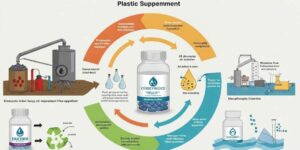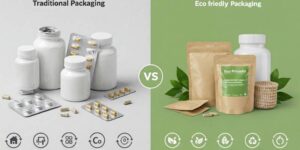The global wellness industry is thriving, with the supplement market expected to surge from USD 27.31 billion in 2024 to USD 42.49 billion by 2034. As more people seek an extra boost—whether through vitamins, minerals, or herbal remedies—health remains a top priority. However, while we focus on the benefits of these supplements, we often overlook their impact on the planet. This is where vegan & eco-friendly matter, ensuring that our wellness choices support both personal health and environmental sustainability.
It’s time to pull back the curtain on the supplement industry and explore why opting for vegan and eco-friendly alternatives isn’t just good for you—it’s a step toward a healthier planet. From reducing carbon emissions to minimizing plastic waste, these choices can make a significant difference.
The Environmental Footprint of Supplements
The supplement industry has a considerable environmental footprint. The raw materials that make up our daily vitamins and herbal concoctions often come from plants, animals, and minerals. The extraction processes can lead to resource depletion, habitat loss, and the disruption of entire ecosystems.
Resource Depletion and Habitat Loss
Unsustainable harvesting practices, particularly for plants like Boswellia serrata (frankincense) or seaweed species used for carrageenan, and overfishing for krill oil, can disrupt ecosystems and contribute to population decline.

Energy-Intensive Production
Traditional supplement production often involves energy-intensive processes and the use of chemicals that contribute to pollution. To illustrate this point, it’s worth considering that traditional vitamin C production methods, if unsustainable, are significantly more energy-intensive than plant-based alternatives. Quantifying environmental impact always strengthens such arguments.
Transportation Emissions
The transportation of raw materials and finished products also contributes to carbon emissions, making locally sourced supplements a more environmentally friendly option.

Pollutants and Waste
Supplement manufacturing can involve the use of pollutants like phthalates (plasticizers linked to hormone disruption) and particulate matter (air pollutants that can cause respiratory problems). Plant-based supplements can also face microbial contamination during production and storage, so quality control is crucial.
Packaging Waste
Most supplements come in plastic bottles, blister packs, or sachets, adding to the global plastic pollution crisis. Every year, an estimated 2.3 billion plastic supplement bottles are produced, and many end up in landfills or oceans, harming ecosystems and wildlife.
- Landfill accumulation contributes to severe soil and water contamination, leaching harmful chemicals into the environment.
- Millions of tons of plastic enter the ocean each year, forming massive garbage patches and harming marine life and disrupting ecosystems.
- Plastic breaks down into microplastics, which are now found everywhere, contaminating food and water sources and potentially entering the human food chain.
- The production and incineration of plastic releases greenhouse gases, contributing to climate change.

Vegan & Eco-Friendly Matter Supplements: A Better Choice
The good news is that we can make a difference. By choosing vegan and eco-friendly supplements, we can significantly reduce our environmental impact.
Reduced Environmental Impact
Plant-based supplements generally require fewer resources and produce fewer greenhouse gas emissions compared to animal-derived options. For example:
- Soy-based protein, a common ingredient in vegan protein powders, has a significantly lower environmental impact than whey protein, which is derived from dairy.
- Algae-based omega-3s, a sustainable alternative to fish oil, produce up to 80% fewer greenhouse gas emissions and avoid the ethical concerns of overfishing.
- Plant-based collagen boosters, made from ingredients like vitamin C and silica, eliminate the need for resource-intensive animal farming.
Vegan diets also contribute to land and resource conservation by reducing the demand for land used for animal agriculture and feed production.
Sustainable Sourcing
Choosing supplements made with sustainably sourced ingredients is essential for protecting the environment. Look for certifications like:
- USDA Organic: Ensures ingredients are grown in a way that protects soil health and water quality, without synthetic pesticides, fertilizers, or GMOs.
- Non-GMO Project Verified: Ensures ingredients are not derived from GMOs, which can promote monoculture and reduce biodiversity, protecting biodiversity and promoting sustainable farming practices.
Eco-Friendly Packaging
Many brands are now using eco-friendly packaging for their supplements, such as:
- Recycled materials, glass containers, or compostable pouches.
- Refill systems or bulk containers to minimize packaging waste.
- Edible packaging, made from natural materials like seaweed or rice starch, which has the potential to eliminate packaging waste altogether.

Brands with Sustainable Practices
Here are a few brands leading the charge in sustainability:
- Terraseed: Compostable bottles and pouches, zero-waste, plant-based ingredients.
- Seed: Refillable glass jars and aluminum containers, biodegradable algae paper boxes, home-compostable pouches.
- Orlo Nutrition: Refillable glass containers, post-consumer recycled pouches and boxes, algae-based omega-3s.
- Mary Ruth’s Organics: Recyclable glass bottles, Clean Label Project Certified, organic ingredients.
- Dr. Vegan: Refillable tins, compostable refills, ethically sourced ingredients, plastic-free.
- Wild Nutrition: Food-grown refillable vitamins, organic, locally sourced, MSC-certified ingredients.
- Pure Synergy: Recyclable packaging, 100% natural vitamin C, wind-powered facility.
- Gaia Herbs: Glass bottles, compostable materials, organic farming, ethical sourcing.

Choosing High-Quality Supplements
While supplements can play an important role in supporting overall health, it’s essential to choose high-quality products that are both effective and ethically produced.
- Manage Expectations: Supplements are not quick fixes or miracle cures. They should be used in conjunction with a healthy lifestyle.
- Look for Reputable Brands: Established brands often have more resources to invest in quality control and sustainable practices.
- Check for Quality Seals: Third-party certifications, such as those from NSF International, USP, or ConsumerLab, indicate that the product has undergone rigorous testing.
- Prioritize Natural Ingredients: Choose supplements with minimal additives and fillers.
- Read Labels Carefully: Pay attention to the ingredient list, dosage, and usage instructions.
- Consult Reliable Sources: Research the company and its practices on its website, or reputable consumer review sites, or consult with a healthcare professional or registered dietitian.
Common Myths About Vegan Supplements
Let’s debunk some common myths about vegan supplements:
- Myth: Vegan supplements are less effective than animal-based ones.
Fact: Plant-based supplements are just as effective. For example, algae-based omega-3s provide the same essential fatty acids as fish oil, without the environmental toll. - Myth: Plant-based proteins are incomplete.
Fact: Combining plant-based proteins (e.g., rice and pea protein) can provide a complete amino acid profile, making them just as effective for muscle repair and growth. - Myth: Vegan supplements are too expensive.
- Fact: While some may cost more upfront, their long-term benefits for your health and the planet often outweigh the price difference.
Conclusion

The supplement industry has a significant environmental impact, but by choosing Vegan & Eco-Friendly Matter options, you’re supporting a healthier planet. From algae-based omega-3s to plant-based collagen boosters, these alternatives prove that what’s good for you can also be good for the Earth.
Start by swapping one animal-derived supplement for a vegan alternative today. Share your journey on social media using #EcoFriendlySupplements to inspire others. Together, we can make a difference—one capsule at a time.
What is the environmental impact of the supplement industry?
The supplement industry has a significant environmental footprint. The extraction of raw materials, like plants, animals, and minerals, can lead to resource depletion, habitat loss, and over-harvesting. Manufacturing processes often involve energy-intensive activities and the use of chemicals that contribute to pollution and carbon emissions. Transportation of raw materials and finished products further adds to carbon emissions. Moreover, supplement packaging, primarily plastic, contributes to the global plastic pollution crisis, filling landfills, polluting oceans, and breaking down into microplastics.
How does traditional supplement production contribute to pollution?
Traditional supplement production often relies on energy-intensive processes and chemical use, leading to pollution. For example, vitamin C production can result in high carbon emissions if sustainable practices aren’t followed. Supplement manufacturing can also involve pollutants like phthalates (from plastic packaging) and particulate matter, potentially posing risks to respiratory and cardiovascular health. Microbial contamination can also occur during the production and storage of plant-based supplements, highlighting the need for stringent quality control.
Why is plastic packaging in the supplement industry a concern?
The supplement industry generates an enormous amount of plastic waste. Billions of plastic supplement bottles are produced annually, with a large portion ending up in landfills. Plastic waste decomposes slowly, leading to soil and water contamination in landfills. It also enters the ocean, harming marine life and ecosystems and breaking down into microplastics that contaminate food and water sources. Furthermore, the production and incineration of plastic release greenhouse gases, contributing to climate change.
What are vegan and eco-friendly supplements, and why are they a better choice?
Vegan supplements are derived from plant-based sources, generally having a lower environmental impact than animal-derived supplements by reducing the demand for animal agriculture, a major contributor to greenhouse gas emissions, deforestation, and water pollution. Eco-friendly supplements prioritize sustainable sourcing of ingredients and eco-friendly packaging. They are a better choice because they minimize resource depletion, reduce pollution, protect ecosystems, and promote a healthier planet.
How can I identify supplements with sustainably sourced ingredients?
Look for certifications like USDA Organic or Non-GMO Project Verified. USDA Organic certification ensures ingredients are grown without synthetic pesticides, fertilizers, or GMOs, promoting soil health and biodiversity. The Non-GMO Project Verified certification guarantees ingredients are not derived from GMOs, protecting biodiversity and sustainable farming. Also, investigate the brand’s sourcing practices and look for transparency in their supply chain.
What are some examples of eco-friendly packaging used in the supplement industry?
Eco-friendly packaging options include recycled materials, glass containers, compostable pouches, refill systems, and bulk containers to minimize waste. Some brands, like Terraseed, use 100% compostable bottles made from beechwood fiber. Others use refillable glass jars and aluminum containers, biodegradable algae paper boxes, or compostable pouches. Edible packaging made from natural materials like seaweed or rice starch is also an innovative approach, though still in early stages of development.
Besides environmental benefits, what else should I consider when choosing supplements?
Beyond sustainability, prioritize high-quality supplements. Look for reputable brands that invest in quality control and sustainable practices. Check for third-party certifications from organizations like NSF International, USP, or ConsumerLab, indicating rigorous testing. Choose supplements with minimal additives and fillers, read labels carefully, and consult reliable sources or a healthcare professional for information about the company and its practices.
How do natural supplements fit into a healthy lifestyle?
Natural supplements are not miracle cures but valuable additions to a holistic wellness routine. They should be part of a broader approach that includes a balanced diet, regular exercise, and stress management. Supplements can support overall well-being by providing essential nutrients, promoting relaxation, or boosting the immune system. They should be used in conjunction with other healthy habits for optimal results.




